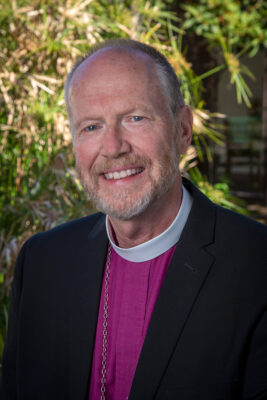(E)pistle: Reflecting on a Momentous Week

When I signed on to be Interim Dean, I didn’t know I would be witnessing one of the biggest changes to happen in the 125-year history of the school.
By now most of you know that—after years of prayer, study, and conversation between the leadership of Trinity Church Wall Street, our parent organization, and the leadership of CDSP—we have made the decision to shift to a fully hybrid educational mode. We will be expanding our much-in-demand Hybrid Program, which combines online learning with onsite intensives.
Accordingly, this year’s entering residential class will be the last to complete their studies in Berkeley on the traditional year-round basis. Once we have made the transition, only the January and June onsite academic intensives will take place here on the West Coast, though our ethos will continue to be shaped by the distinctive creativity and adaptation that is so characteristic of the Episcopal Church in the western United States.
I want to acknowledge that the impact of this decision is difficult for some members of the CDSP community. Many of our current and past residential students have expressed understandable pain and frustration that the particular way they have experienced formation here on Holy Hill will not be available to new classes and generations of students. Our residential program may not be large, but it is distinctive in many ways, and we want to celebrate and give thanks for the community gathered here, even as we begin taking steps toward our new reality.
Ultimately, decreasing residential enrollment made it increasingly untenable to maintain our large and expensive physical plant—a challenge many if not most theological institutions have experienced in recent years. Yet it would be a mistake to see this decision only as an economic one.
We believe this shift will allow a greater diversity of students to access high-quality, community-oriented theological education and claim their roles in leading the Church of the future. To that end, Trinity Church has generously committed to pay for two years of curacy or other ministry-based employment for our new graduates in their home dioceses.
As far as we know, this is an unprecedented form of support for local churches by a seminary. We know many of our students feel called to serve in communities that cannot afford to hire them. The curacy program is a bold example of investing in people rather than buildings.
Speaking of buildings, and since many people have asked, let me also confirm that if parts of the campus are leased or sold as our space needs change, all of the proceeds will be used for supporting the operations of CDSP.
It has been an honor for me to be part of this new vision for theological education. Despite the challenges of the transition ahead, I sincerely believe this is the beginning of a positive and Spirit-filled new chapter for this school, for its faculty, staff, and students, and for our contribution to the flourishing of the wider Church.
Kirk

